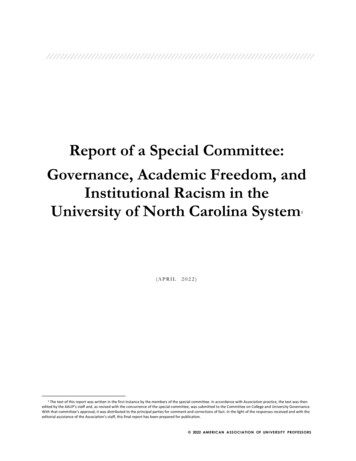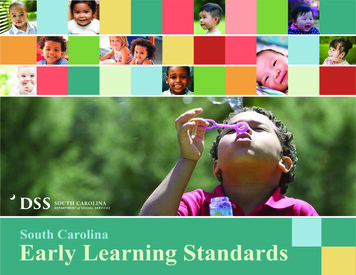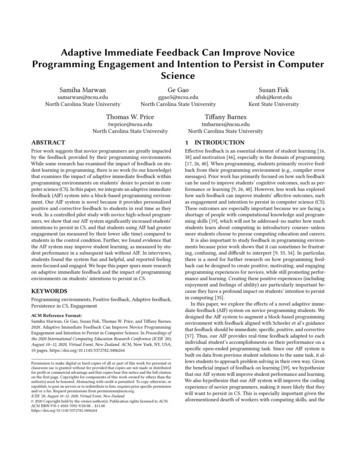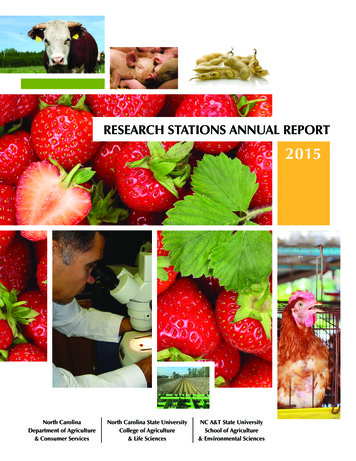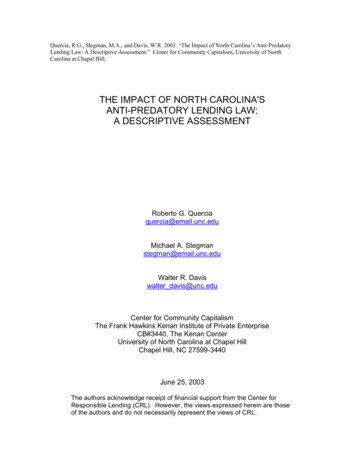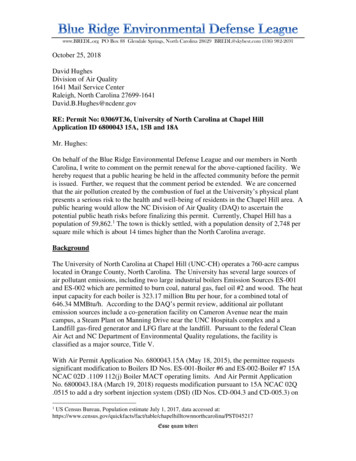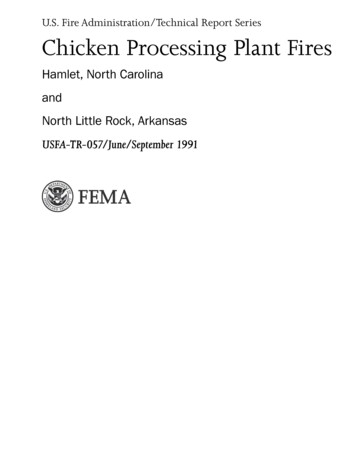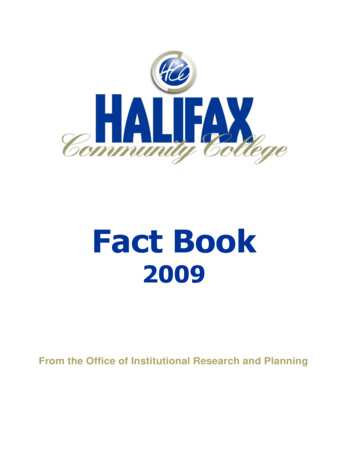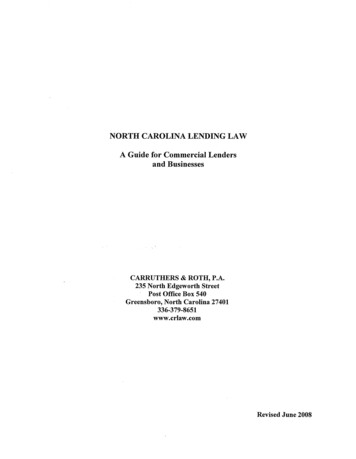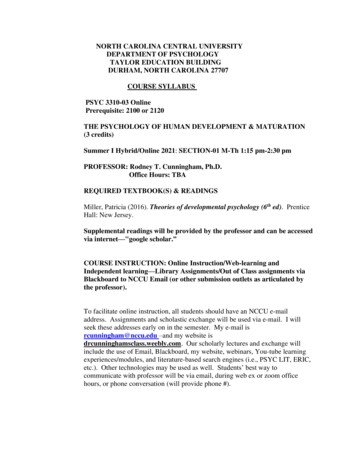
Transcription
NORTH CAROLINA CENTRAL UNIVERSITYDEPARTMENT OF PSYCHOLOGYTAYLOR EDUCATION BUILDINGDURHAM, NORTH CAROLINA 27707COURSE SYLLABUSPSYC 3310-03 OnlinePrerequisite: 2100 or 2120THE PSYCHOLOGY OF HUMAN DEVELOPMENT & MATURATION(3 credits)Summer I Hybrid/Online 2021: SECTION-01 M-Th 1:15 pm-2:30 pmPROFESSOR: Rodney T. Cunningham, Ph.D.Office Hours: TBAREQUIRED TEXTBOOK(S) & READINGSMiller, Patricia (2016). Theories of developmental psychology (6th ed). PrenticeHall: New Jersey.Supplemental readings will be provided by the professor and can be accessedvia internet—"google scholar.”COURSE INSTRUCTION: Online Instruction/Web-learning andIndependent learning—Library Assignments/Out of Class assignments viaBlackboard to NCCU Email (or other submission outlets as articulated bythe professor).To facilitate online instruction, all students should have an NCCU e-mailaddress. Assignments and scholastic exchange will be used via e-mail. I willseek these addresses early on in the semester. My e-mail isrcunningham@nccu.edu –and my website isdrcunninghamsclass.weebly.com. Our scholarly lectures and exchange willinclude the use of Email, Blackboard, my website, webinars, You-tube learningexperiences/modules, and literature-based search engines (i.e., PSYC LIT, ERIC,etc.). Other technologies may be used as well. Students’ best way tocommunicate with professor will be via email, during web ex or zoom officehours, or phone conversation (will provide phone #).
COURSE POLICIES AND REGULATIONS:Students are to thoroughly and attentively follow course calendar for all lectures,reading and learning assignments, quizzes, tests, and/or papers, and due dates.Moreover, as college students, and future leaders of our world, you are expectedto respect yourself and your fellow student colleagues. As a class, you shouldseek to support each others goals, desires, and expectations.Also, because we are in an environment of higher learning and ethicalaccountability, cheating and dishonesty will not be tolerated. This includes, butis not limited to acts of academic dishonesty such as cheating on tests andassignments, and plagiarism (see university catalog regarding academicdishonesty). Students who engage in these activities will be immediatelyremanded to the Departmental Chair, Dean of the College of Behavioral andSocial Sciences, and potentially to the Provost/Vice-President of AcademicAffairs. Therefore, very serious consequences will emerge from this type ofbehavior.Relevantly, work submitted late will not be accepted without appropriatedocumentation (i.e., doctors, court, death eulogy on date of due assignment).Indeed, the same policy holds for makeup examinations. All of this should beperformed with and using adult and committed student behavior.FYI-You should also check your email and technology I inform you of regularlyfor current and future assignments relevant to your academic tasks. Failure to doso will result in 100% student liability and there will be no make-ups (withoutappropriate documentation, see above) due to such behaviors.In the case of adverse weather conditions, refer to University telecommunicationsregarding cancellations, delays, and other alterations to normal University day-today operations (see catalog for more information regarding adverse weatherconditions).COURSE DESCRIPTION:This course will provide students an introduction to the study of human growth anddevelopment from conception through adulthood and death.COURSE GOALS:The course seeks to introduce students to the conceptual, theoretical, and empiricalmanifestations attendant to human growth and development. It will exposestudents to a distillation of theories, paradigms, and research from previous andextant literature in the psychology of human development and maturation.
This course embodies other goals as well. One goal is to provide studentengagement in various critical thinking activities. As such, students will participatein critical analysis of traditional and modern contributions of human developmentaltheorists. Indeed, this course will provide more insight to advanced students inpsychology and behavioral science how they must be critical thinkers in the questto service and nurture proactively current and future development and maturationalissues. They must further employ such skills in contributing to the knowledge baseof information in these lines of inquiry.Another goal includes the analysis of the scientific/empirical methods utilized indevelopmental research. As well, information addressed will share a goal of betterunderstanding the developmental paths from infancy, childhood, adolescence,adulthood, and middle adulthood until death.Because North Carolina Central University is a historically African-Americaninstitution, I feel that information addressed in this course should promote thesalience and integrity of the African-American experience. Thus, literaturefocusing on issues relevant to diversity and cultural psychology in the humandevelopment and maturation of African Americans will be advanced. Other topicalareas addressing issues relevant to minorities and individuals from varying socialeconomic backgrounds will also be topics for discussion.*TOPICAL AREAS: Academic Content CalendarI.Introduction to Human Development and Maturation. 5/26/2021a) Video lectures: Influences on Development1) Normative Age Grade2) Normative History Grade3) Non-Normative Eventsb) Reading of Articles or Literature regarding influences on developmentand goals of developmental psychologists (for 5/26 and 5/27 reading).Jacobson, R. (2020). Supporting kids during the coronavirus crisis:Tips for nurturing and protecting children at home. New York:Child Mind Institute. vid-19-crisis/.Sandstrom, H. & Huerta, S. (2013). The negative effects of instabilityon child development: A research synopsis. Washington, D.C.: TheUrban Institute. (PDF)
II.Introduction to Human Development and Maturation. 5/27/2021a) Video Lectures: Goals of Developmental Psychologists1) Description of individual and maturity2) Identify steps between individual development3) Explain transformation of maturity4) Articulate variables in the transformationb) Video Lecture: Student examples of influences on development1) Alvarenga, Manuel, Dolan, & Shepard (2018)2) Bromley (2018)3) Cameron (2018)4) Dixon (2018)5) Robinson (2018)QUIZ ON INFLUENCES OF DEVELOPMENTAL PSYCHOLOGY 6/1/2021III.Theories of Human Development and Maturation.A)Video Lecture: Freudian Psychoanalytic Theory 6/2/20211) Introduction to Freudian Theory2) The “Psyche”3) Watch You-Tube video, Defense Mechanisms—AP, FlippedLesson, 12 minutes and 45 seconds4) Watch You-Tube video, Sigmund Freud: Id, Ego, SuperegoExplained, 5 minutes 23 secondsB)Video Lecture: Stages of Psychoanalytic Theory 6/3/20211) Oral Stage2) Anal Stage3) Phallic Stage4) Watch You Tube video, “Shorts in Psychology,”Psychoanalytic Stages of Development (14 minutes and 37seconds)5) Watch You Tube video, “Daddy Issues Explained-FreudsPsychosexual Developmental Stages,” 5 minutes 29 secondsC)Video Lecture: Stages of Psychoanalytic Theory 6/7/20211) Latency Stage2) Genital Stage3) Strengths and Weaknesses4) Review of Freudian Theory
Reading:De Sousa A., (2011). Freudian Theory and Consciousness: AConceptual Analysis. In A.R. Singh and S.A. Singh (eds.) Brain,Mind and Consciousness: An International, InterdisciplinaryPerspective, MSM, 9(1), 210-217.EXAMINATION I—FREUDIAN PSYCHOLOGY 6/8/2021D)Video Lecture: Erikson’s Psychosocial Theory 6/9/20211) Introduction2) Trust vs Mistrust3) Autonomy vs Shame and Doubt4) Initiative vs Guilt5) Watch You tube videosE)Video Lecture: Erikson’s Psychosocial Theory 6/10/20211) Identity vs Identity Diffusion2) Intimacy vs Isolation3) Generativity vs Stagnation4) Integrity vs Despair5) Reading assignments and You Tube VideosF)Video Lecture: Erikson’s Psychosocial Theory 6/14/20211) Analysis, Hurt People Hurt People2) Happy People Make People Happy3) Strengths and Weaknesses4) ReviewEXAMINATION II ERIKSON’S THEORY 6/15/2021G)Video Lecture: Piaget’s Theory of Cognitive Development 6/16/20211) Introduction to Piaget2) Sensorimotor Stage3) Watch You tube videosH)Video Lecture: Piaget’s Theory of Cognitive Development 6/17/20211) Preoperational Stage2) Concrete Operations Stage3) Watch You tube video, Preoperational/Concrete OperationalInterview, Selah—4 years, 18 minutes and 2 secondsI)Video Lecture: Piaget’s Theory of Cognitive Development 6/21/20211) Formal Operations2) Additional Reading TBA
3) Watch You tube video, Jean Piaget’s 4 stages of CognitiveDevelopment, 18 minutes and 34 seconds4) ReviewEXAMINATION III PIAGET’S THEORY 6/22/2021J)1) Independent Study – Topic TBA 6/23/2021K)2) Independent Study – Topic TBA 6/24/2021FINAL EXAM OR PAPER DUE 6/25/2021*All video lectures and you tube videos should be immediately accompanied byreading the text and selected readings in the focused area before and/or after theseviewings. This material should also be studied on the students own personal timefor deeper understanding and interpretation of information.**More specific information/directions will be given regarding times and dates forsubmissions of quizzes, exams, and/or paper.*** Times and content assigned for academic criterion are subject to change at thediscretion of the professor. Also, given any special circumstances deemed salientby the professor (or professor innovations), performance tasks are also subject tochange. However, in these special cases, they are normally only incorporated tofacilitate student success.STUDENT LEARNING OUTCOMES:1) Students will be able to explain and exhibit knowledge-base ofthe major factors and determinants of human developmentand developmental psychology.2) Students will be able to explain, differentiate, and analyticallycompare/contrast Freud’s and Erikson’s theories ofpsychoanalytic and psychosocial development and theinfluence of the “psyche” (id, ego, and superego) asindividuals’ transition through the stages.3) Students will be able to explain, differentiate, and analyticallycompare/contrast Piaget’s theory of cognitive humandevelopment. As examples, students will be able to identifyand describe the forces of assimilation and accommodation
during transitions from lower-order thinking (sensorimotor) tohigher-order thinking (formal operations).4) Students will be able to explain, infer, and relate to an area ofstudy in human development relevant to cultural diversity andinclusion. In addition, students will be able to assess Boykin’snotion of African American experience and its interplaybetween mainstream, minority, and Afro-cultural experiences.5) Students will be able to compose a scholarly paper addressinghuman and psychological development throughout the lifespan. This shall consist of an in-depth analysis of traditionaland modern contributions to human and psychologicaldevelopmental theory. In this paper, students will analyze andsynthesize information to justify their interpretation andevaluation of the scientific merits and application of thetheoretical position advanced.GRADING CRITERION:Final grading will include the ratio of 3 exams, 1 paper (or another exam), andquizzes/special assignments. The evaluative criterion and percentilemeasurements are depicted below.Test #1 20%Test #2 20%Test #3 25%Final Exam or Paper 25%* Quizzes, Extra Credit, and/or Special Assignments 10%Student Disability Services StatementStudents with disabilities (physical, learning, psychological, chronic medical, etc.)who would like to request accommodations and services are required to registerwith the Office of Student Disability Services (SDS) in Suite 120 in the StudentServices Building. Please contact the SDS Staff at 919 530-6325 or emailsds@nccu.edu. If you are NEW to SDS, please contact the office for anappointment. If you had accommodations previously, you can resubmit a requestby visiting our website at www.nccu.edu/sds and clicking on theAccommodations Link. Students are expected to update their accommodationseach semester, preferably during the first two weeks of each semester.Student Support/Ombudsperson
The Student Ombudsperson is available to assist students in navigating unexpected life events(e.g., short term illness/injury, loss of loved one, personal crises) and guide them to theappropriate University or community resources. Students may also receive assistance withresolving some emergency financial concerns, understanding NCCU policies or general problemsolving strategies. Schedule an appointment by contacting the Student Ombudsperson in theOffice of the Dean of Students, G-06 Student Services Building at 919-530-7492 onbsimmons@nccu.edu. Absence Policy (2018-19):If a student misses three consecutive class meetings, or misses more classes than the facultymember deems advisable, the faculty member is required to enter the information into Grades First,and to also report the information regarding the student’s attendance record to the student’s academicdean for appropriate follow-up. 5.3Students who miss class to participate in university-authorized activities shall be providedwith excused absences for the missed class time. It is the student’s responsibility to inform thefaculty member of such activities at least one week before the authorized absence, and to make up allwork as determined by the faculty member.Statement of Inclusion/Non-DiscriminationNorth Carolina Central University is committed to the principles of affirmative action and non-discrimination.The University welcomes diversity in its student body, its staff, its faculty, and its administration. The Universityadmits, hires, evaluates, promotes, and rewards on the basis of the needs and relevant performance criteriawithout regard to race, color, national origin, ethnicity, sex, sexual orientation, gender identity, genderexpression, age, disability, genetic information, veteran's status, or religion. It actively promotes diversity andrespectfulness of each individual.Student Accessibility ServicesStudents with disabilities (physical, learning, psychological, chronic or temporary medical conditions, etc.) whowould like to request reasonable accommodations and services under the Americans with Disabilities Act mustregister with the Office of Student Accessibility Services (SAS) in Suite 120 in the Student Services Building.Students who are new to SAS or who are requesting new accommodations should contact SAS at (919) 5306325 or SAS@nccu.edu to discuss the programs and services offered by SAS. Students who are alreadyregistered with SAS and who would like to maintain their accommodations must renew previously grantedaccommodations by visiting the SAS website at www.nccu.edu/SAS and logging into EagleAccommodate. Students are expected to renew previously granted accommodations at the beginning of eachsemester, preferably during the first two (2) weeks of class. Reasonable accommodations can be requested atany time throughout the semester; however, they will not be effective retroactively. Students are stronglyencouraged to contact their professors to discuss the testing and academic accommodations that they anticipateneeding for each class.Students identifying as pregnant or other pregnancy-related conditions who would like to request reasonableaccommodations and services under Title IX must register with the Office of Student Accessibility Services.Confidentiality and Mandatory ReportingAll forms of discrimination based on sex, including sexual misconduct, sexual assault, dating violence, domesticviolence, and stalking offenses, are prohibited under NCCU’s Sexual Misconduct Policy (POL 01.04.4). NCCUfaculty and instructors are considered to be responsible employees and are required to report informationregarding sexual misconduct to the University’s Title IX Coordinator. The Sexual Misconduct Policy can onswebsite
at www.nccu.edu/policies/retrieve.cfm?id 450. Any individual may report a violation of the SexualMisconduct Policy (including a third-party or anonymous report) by contacting the Title IX Coordinator at(919)530-7944 h Univ&layout id 15.Other Campus Programs, Services, Activities, and ResourcesOther campus resources to support NCCU students include: Student Advocacy Coordinator. The Student Advocacy Coordinator is available to assist students innavigating unexpected life events (e.g. short-term illness/injury, loss of a loved one, personal crises) andguide them to the appropriate University or community resources. Students may also receive assistancewith resolving some emergency financial concerns; understanding NCCU policies, rules and regulations; orgeneral problem-solving strategies. Contact Information: Student Services Building, Suite 236, (919) 5307492, studentadvocacy@nccu.edu. Counseling Center. The NCCU Counseling Center is staffed by licensed psychologists and mental healthprofessionals who provide individual and group counseling, crisis intervention, substance abuseprevention and intervention, anger management, and other services. The Counseling Center also providesconfidential resources for students reporting a violation of NCCU’s Sexual Misconduct Policy. ContactInformation: Student Health Building, 2nd Floor, (919) 530-7646, counseling@nccu.edu. University Police Department. The University Police Department ensures that students, faculty and staffhave a safe and secure environment in which they can live, learn, and work. The Department provides afull range of police services, including investigating all crimes committed in and around its jurisdiction,making arrests, providing crime prevention/community programs, enforcing parking regulations andtraffic laws, and maintaining crowd control for campus special events. Contact Information: 2010Fayetteville Street, (919) 530-6106, nccupdinfo@nccu.edu.
By this document, you have read and clearly understand the rules, regulations, and contentdomain that will be covered in this course. Indeed, by this document, you share fullresponsibility to adhere and follow the preceding notions.Date
Please contact the SDS Staff at 919 530-6325 or email sds@nccu.edu. If you are NEW to SDS, please contact the office for an appointment. If you had accommodations previously, you can resubmit a request by visiting our website at www.nccu.edu/sds and clicking on the Accommodations Link.
